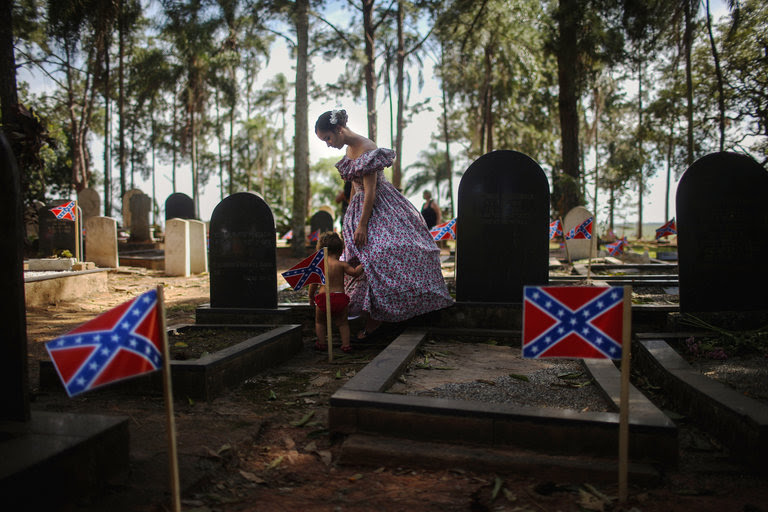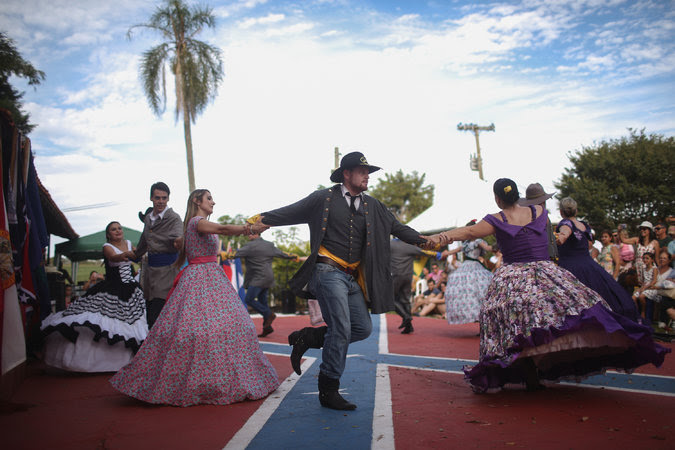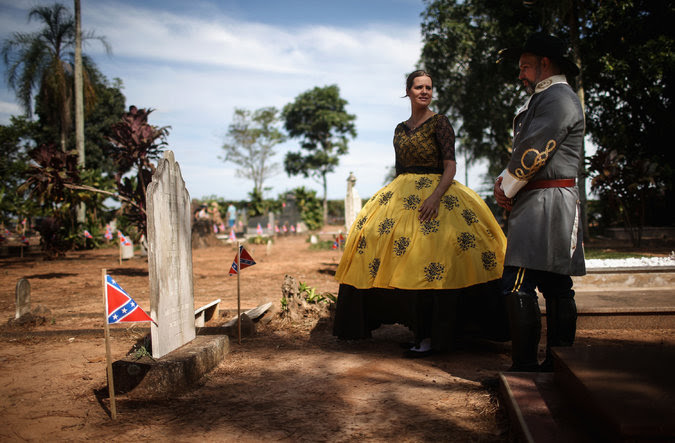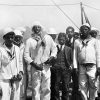By SIMON ROMERO

A woman in a traditional hoop skirt walked past graves adorned with Confederate battle flags in Santa Bárbara d’Oeste, Brazil. An annual celebration of the area’s Confederate many settlers was held in the cemetery last month. Credit Mario Tama/Getty Images SANTA BÁRBARA D’OESTE, Brazil — On a stage festooned with Confederate flags, a singer was belting out “Dixieland Delight” by Alabama near an obelisk honoring the Americans who fled to this outpost in the aftermath of the Civil War.
“We’re not racists,” said Cícero Carr, 54, an engineer whose great-great-grandfather hailed from Texas. Wearing a fedora featuring the rebel battle flag, he explained in Portuguese, “We’re just revering our ancestors who had the good sense to settle in Brazil.”
At the annual celebration of Brazil’s self-described Confederados one scorching Sunday in April, Confederate flags adorned the hoop-skirted gowns of young belles and the trucker caps worn by beer-guzzling bikers, as well as the graves of pioneers with surnames like McAlpine, Northrup and Seawright.
The commemoration reflected the resilience of what some historians call the lost colony of the Confederacy in this region of sugar cane fields and textile factories. Unencumbered by the debate raging in the United States over whether Confederate symbols promote racism, the Brazilian descendants of the American settlers, many of them clad in Civil War uniforms, mingled at food stands offering Southern fried chicken and buttermilk biscuits.
The motto of the organizers: To Live and Die in Dixie.
The presence of the Confederados in the interior of São Paulo State dates to an effort by Emperor Dom Pedro II, a staunch ally of the Confederate States of America during the Civil War, to lure white immigrants to Brazil. Thousands of Southerners took him up on his offer, moving here in the 1860s and 1870s.
Unable to adjust to Brazil’s boom-and-bust economy, many of the colonists returned to the United States. But others put down stakes in a country that was the last in the Americas to abolish slavery, doing so in 1888, allowing some of the Americans to acquire slaves for their plantations in Brazil.
Despite this history, the debate in the United States over Confederate symbols has barely resonated here since the rebel flag became a renewed target of outrage last year after a gunman who glorified the flag massacred nine African-Americans at a church in Charleston, S.C.

People dancing in Confederacy-inspired outfits at the celebration last month. Credit Mario Tama/Getty Images Instead, the descendants of the Confederates, who are thought to number in the thousands across Brazil, generally say their festivities are detached from the polarizing views around similar commemorations in the United States.
Among the hundreds who attended April’s Festa Confederada (Confederate Party), including some visitors of African descent, the discussion around the flag’s meaning to descendants of enslaved Africans hardly registered. (Brazilians who define themselves as black or mixed race make up nearly 51 percent of the country’s population, according to Brazil’s 2010 census.)
“I’m here just because I just love America,” said Sergio Porto, 38, a worker at a truck parts factory in São Paulo who was wearing a Confederate bandanna and a T-shirt saying “Hillbilly Treasure.” Mr. Porto explained that he was part of a subculture in Brazil that exalts the rural culture of the Southern United States and listens to Brazilian bands that perform country music in English instead of Portuguese.
Marcelo Sans Dodson, the president of the organization here representing descendants of Confederates, expressed his condolences in a statement about the Charleston massacre. He called the killings a “clear example of intolerance.”
Still, Mr. Dodson defended using symbols of the Old South to celebrate the heritage of Brazil’s Confederados. “For us,” he said, “the Confederate flag symbolizes family, unity, fraternity and friendship.”
Some Confederados go further, arguing that examples of intermarriage in their ranks over the generations have diluted the toxic legacy of slavery. Others say Brazil’s prohibition on importing slaves forged a sense of self-reliance among ancestors fleeing economic devastation who could not bring slaves with them or were too poor to buy slaves in Brazil.
But some scholars say the skirting of slavery during the celebration of Confederate heritage reflects a broader reluctance in Brazil to examine the staggering scale of the slave trade in the country’s history.
Brazil received far more African slaves than any other country in the Western Hemisphere, about 4.9 million through the Atlantic trade, while mainland North America imported about 389,000, according to the Trans-Atlantic Slave Trade Database.

Historians examining the Confederate exodus say some of the Southerners bolstered Brazil’s slavery-based economy, citing the settlers who brought African-American servants with them who were effectively still held in bondage. And once in Brazil, many of the Confederates took advantage of the ease and low cost of acquiring slaves.
“There’s an attempt by the Confederados to erase the interest in slavery as a principal motivation for their arrival in Brazil,” said Luciana da Cruz Brito, a Brazilian historian of slavery at the City University of New York.
In one example, Ms. Brito documented a case in which Charles G. Gunter, a former Alabama state representative, described in 1866 the acquisition of 40 slaves in Brazil for $12,500. That amount is thought to be cheaper than similar deals in the United States before slavery was prohibited.
As Brazil’s abolitionists advanced their cause in the late 19th century, some of the Confederados sought to preserve slavery even as the region around their settlements emerged as a setting for slave revolts.
In 1888, just months before Brazil abolished slavery, the Confederate immigrants James H. Warne and John J. Klink led a mob that carried out one of the most notorious lynchings of that chaotic period, killing Joaquim Firmino, the abolitionist police chief in a town near Santa Bárbara d’Oeste, in front of his family.
“Many of the Confederate immigrants were remorseless white supremacists,” said Maria Helena Machado, a historian of slavery at the University of São Paulo.
Another historian, Gerald Horne of the University of Houston, compared the Confederate migration to Brazil to an exodus of American Southerners after the Civil War to Fiji and other places in the Pacific, where they helped establish a trade in enslaved Melanesians and Polynesians.
“Of course, reluctance to pursue abolition was not the only cause for this migration,” Dr. Horne said. “Many of the migrants had good reason to believe they would be prosecuted for treason, while many simply endured a sour distaste when contemplating a different kind of relationship with Africans than what had existed previously.”

Fred Padovese, a Brazilian descendant of American settlers, and Livia Paulillo visiting a settler’s grave during the celebration. Credit Mario Tama/Getty Images Generations after the first Confederates arrived here, some are trying to decipher their complex legacy. Around Brazil, their descendants include Ellen Gracie Northfleet, a former justice on Brazil’s Supreme Court; Rita Lee Jones, a rock singer and animal-rights activist; and Gregório Duvivier, a comedian who writes a biting satirical column in the newspaper Folha de S. Paulo.
While the descendants are scattered around Brazil, the commemoration at the Cemitério dos Americanos even lured a few Americans who had traveled thousands of miles below the Mason-Dixon line.
“I feel right at home here,” said Stanley Hudson, 60, a lawyer from Dallas who had heard about the commemoration through the Sons of Confederate Veterans, an association of descendants of Confederate soldiers. Dressed in a captain’s uniform, he added, “You’ve got to admire them for maintaining the culture through so many generations.”
Another visitor from afar, Dionne Ford, an African-American writer who lived here as an exchange student in 1985, returned this year to work on a documentary film with Godfrey Cheshire, an American writer and director known for his exploration of his family’s complicated ownership of a North Carolina plantation.
“This was the first place I saw a Confederate flag up close,” said Ms. Ford, 46, who was raised in New Jersey.
While Ms. Ford said she hoped to explore the “complexities of race and history” among the Confederados, the festivities in April seemed to offer instead a simplified Brazilian rendition of Southern culture in the United States.
Near the stage where couples practiced Fanci-Dancing, as a sign put it, vendors hawked T-shirts with the slogan “Rebel & Proud of It.” Everything on sale could be paid for with Confederate dollars obtainable at the entrance.
“This is a joyful event,” said Carlos Copriva, 52, a security guard who described his ancestry as a mix of Hungarian and Italian. He was wearing a Confederate kepi cap that he had bought online as he and his wife, Raquel Copriva, who is Afro-Brazilian, strolled through the bougainvillea-shaded cemetery.
Smiling at her husband, Ms. Copriva, 43, who works as a maid, gazed at the graves around them. “We know there was slavery in both the United States and Brazil, but look at us now, white and black, together in this place,” she said while pointing to the tombstones. “Maybe we’re the future and they’re the past.”

Preview YouTube video Hillbilly Rawhide – Hillbilly Treasure (Official Video)

Preview YouTube video Johnny Voxx- On the Road Again (Willie Nelson)















